The restaurant is a time capsule. Art deco posters track the flow of Soviet Union popular culture throughout the 20th century, turning white walls into a graphic novel of block colours. They call volunteers to join the 1917 October Revolution or save meat during World War II rationing. Over a stout wooden table, a Russian football shirt hangs next to a Ukrainian scarf.
Dumplings Ru is the only Ukrainian-Russian restaurant in Singapore. Its owners, Ukrainian-Russian couple Vadim Zoubovski and Alena Zoubovska, started the eatery in 2019 to share the food and culture of their homeland with Singaporeans. Their signature is plump and meaty pelmeni, Russian dumplings which wrap bundles of succulent seasoned meat in blankets of soft dough.
“Dumplings are known by everyone,” said Zoubovski, standing over a steaming plate of pork pelmeni. “I say dumplings, everyone knows [what I mean]. I say ‘Russian dumplings,’ maybe they want to try. It’s a shared culture thing.” He smiled, his steely grey eyes crinkling. “But then, it’s also a marketing thing.”
As conflict continues to rage between Ukraine and Russia, Singapore’s Ukrainian-Russian restaurateurs are using the morsels to tackle hate speech, share their heritage and take a stand over the conflict back home.
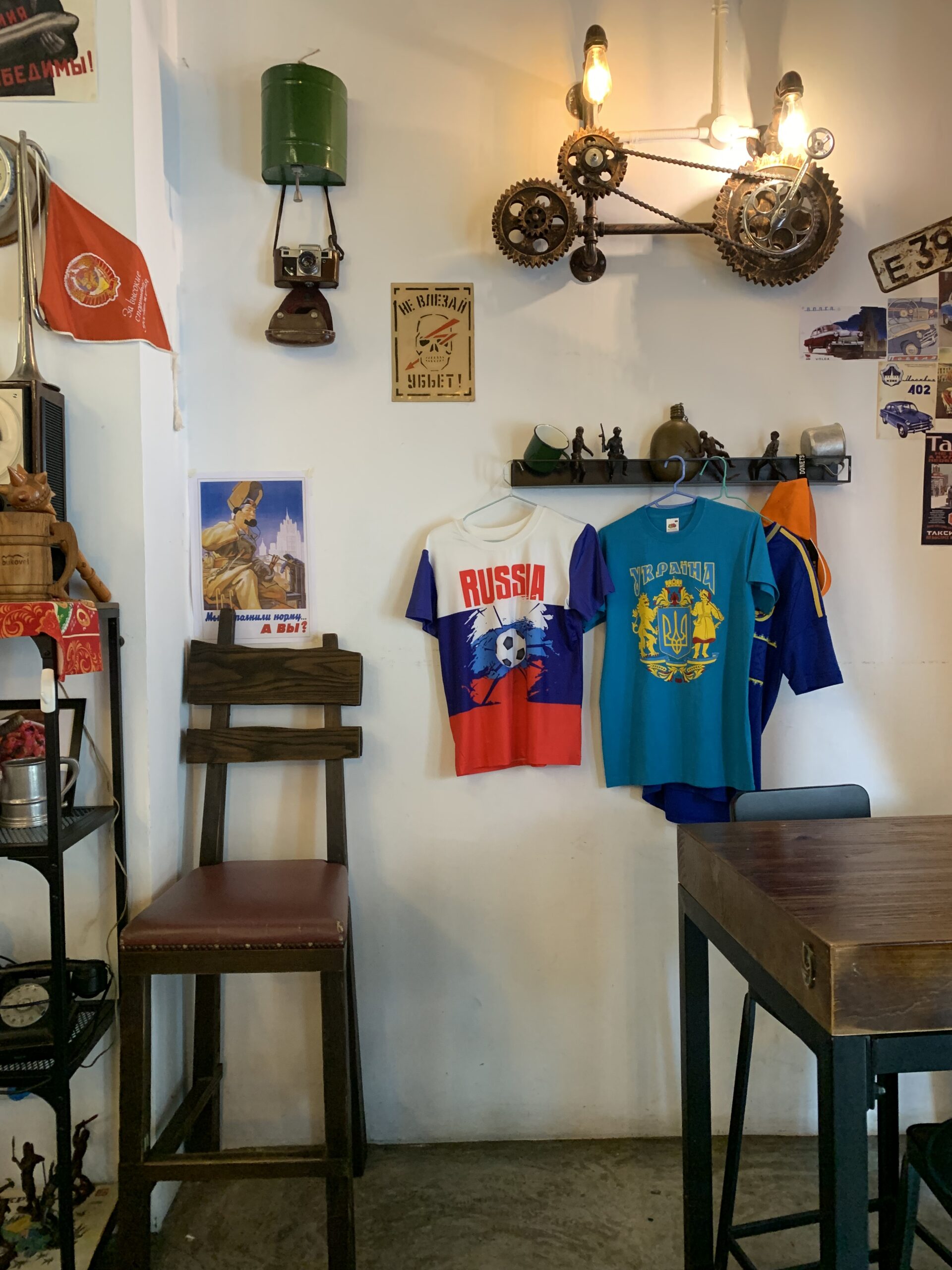
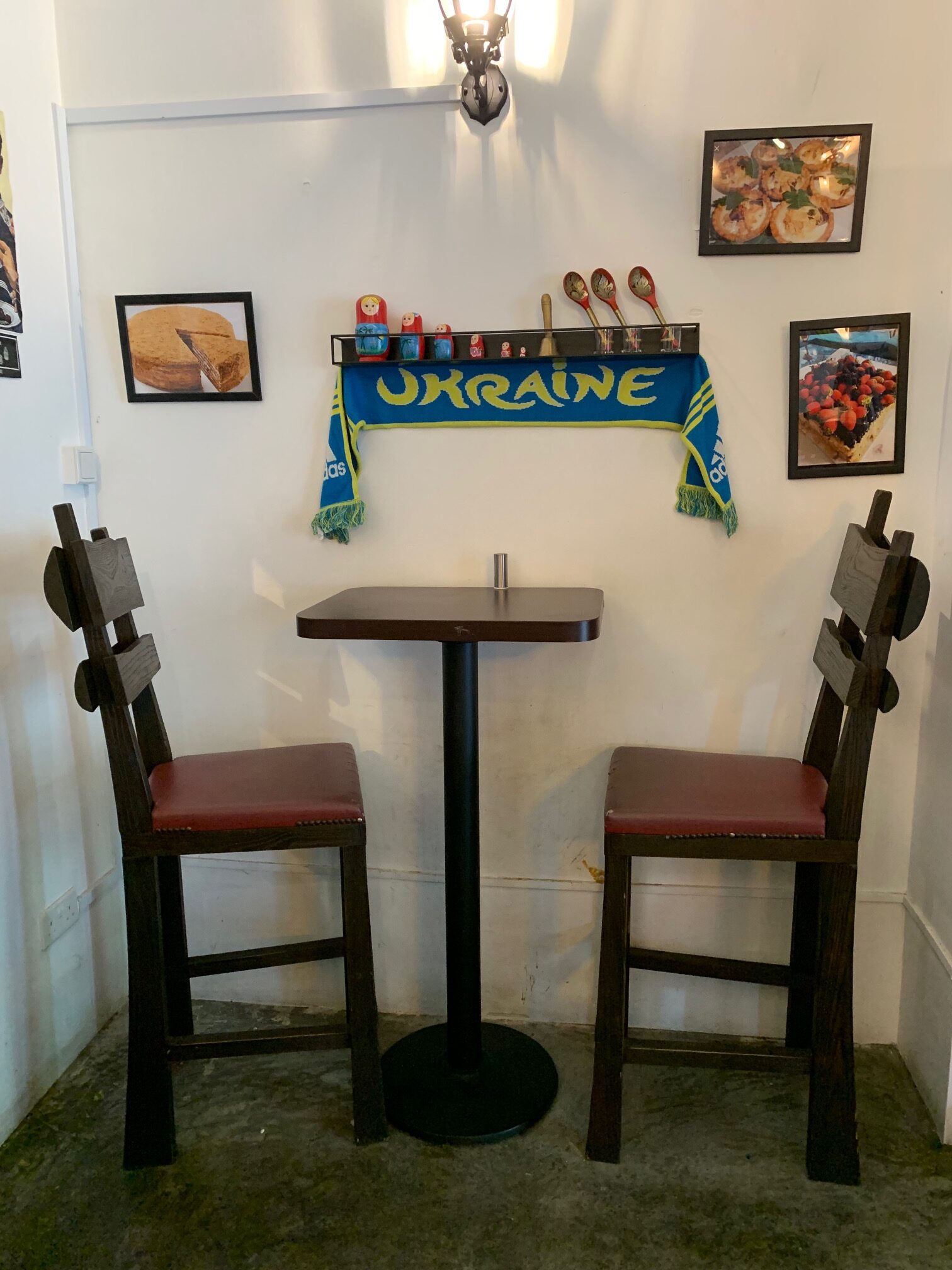
There are approximately 450 Ukrainians and 4,000 Russians living in Singapore. Despite their strength in numbers, many Russians in the city-state have endured hostility as their native country continues a brutal invasion of Ukraine.
Zoubovski and Zoubovska are no exception. When the conflict started, pelmeni orders on their online platform were replaced with abusive posts and calls to boycott the eatery.
“The first reaction is always to shoot back,” Zoubovski admitted. “Instead, [we decided] we’d better share who we are and [how] we are also affected by this war.”
The restaurant currently commits 10% of its delivery sales to Ukrainian humanitarian aid. Pelmeni sales in Singapore are helping those whose lives have been torn apart in Eastern Europe.
Zoubovski is a Russian citizen. He was born and raised in Luhansk, a city in Eastern Ukraine’s breakaway Donbas region, which has been led by pro-Russia separatists for close to a decade. Russian President Vladimir Putin recognised the area as the independent Luhansk People’s Republic on 21 February, three days before Russia used the separatist region as a launchpad for a full-scale invasion of Ukraine.
“This is not today’s news,” said Zoubovski, as photos of homes blasted to rubble and pale-faced university students clad in military combat fatigues flooded international headlines. “I was born in East Ukraine, under rebels. I’ve known this war. It’s a long-term conflict.”
After moving to Moscow, where he met Zoubovska, the couple settled in Singapore 18 years ago with their young son and have acquired permanent resident status. But the war has kept friends and relatives back home at the forefront of their minds.
“I was 100% assured it wouldn’t happen,” Zoubovski said. “This comes as a shock.”
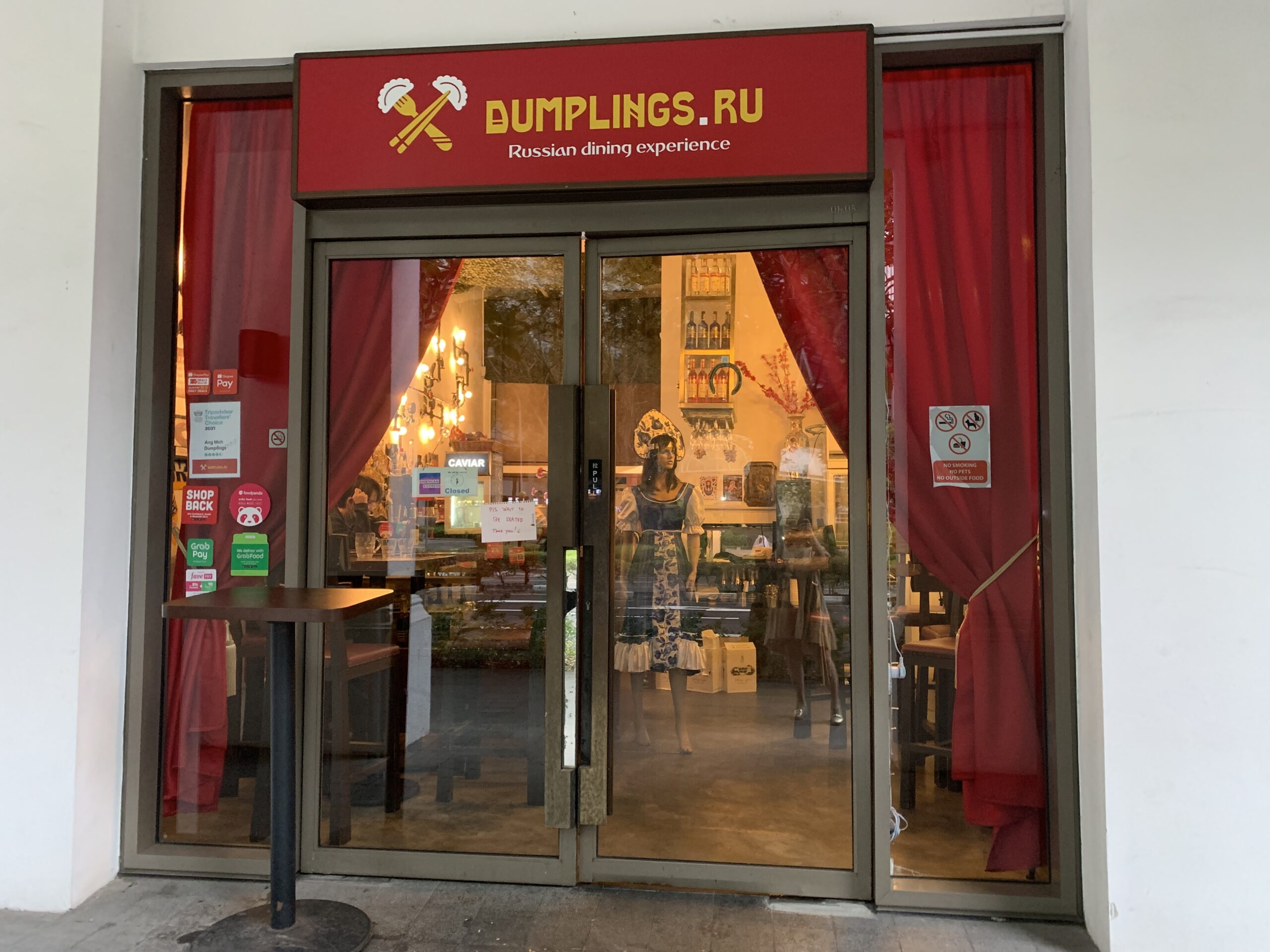
As the conflict continues, things are changing fast and Zoubovski and Zoubovska struggle to keep up with friends and family. Russian websites are blocked. From Ukraine, most of the information available is from government sites, and state-issued media is something they view with scepticism.
“There is no neutral view,” Zoubovski said. “Everyone is filled with emotion, even the news. On the other hand, we don’t have any other source [of information].” The couple rely on family video calls for updates: personal anecdotes of night sirens and metro station shelters in Kyiv, shooting in East Ukraine, the relative safety of Odessa.
In Singapore, the online appetite has re-accepted the couple and their dishes, at least for now.
“Blame those who make war, not dumplings,” proclaimed one post on the restaurant’s social media platform.
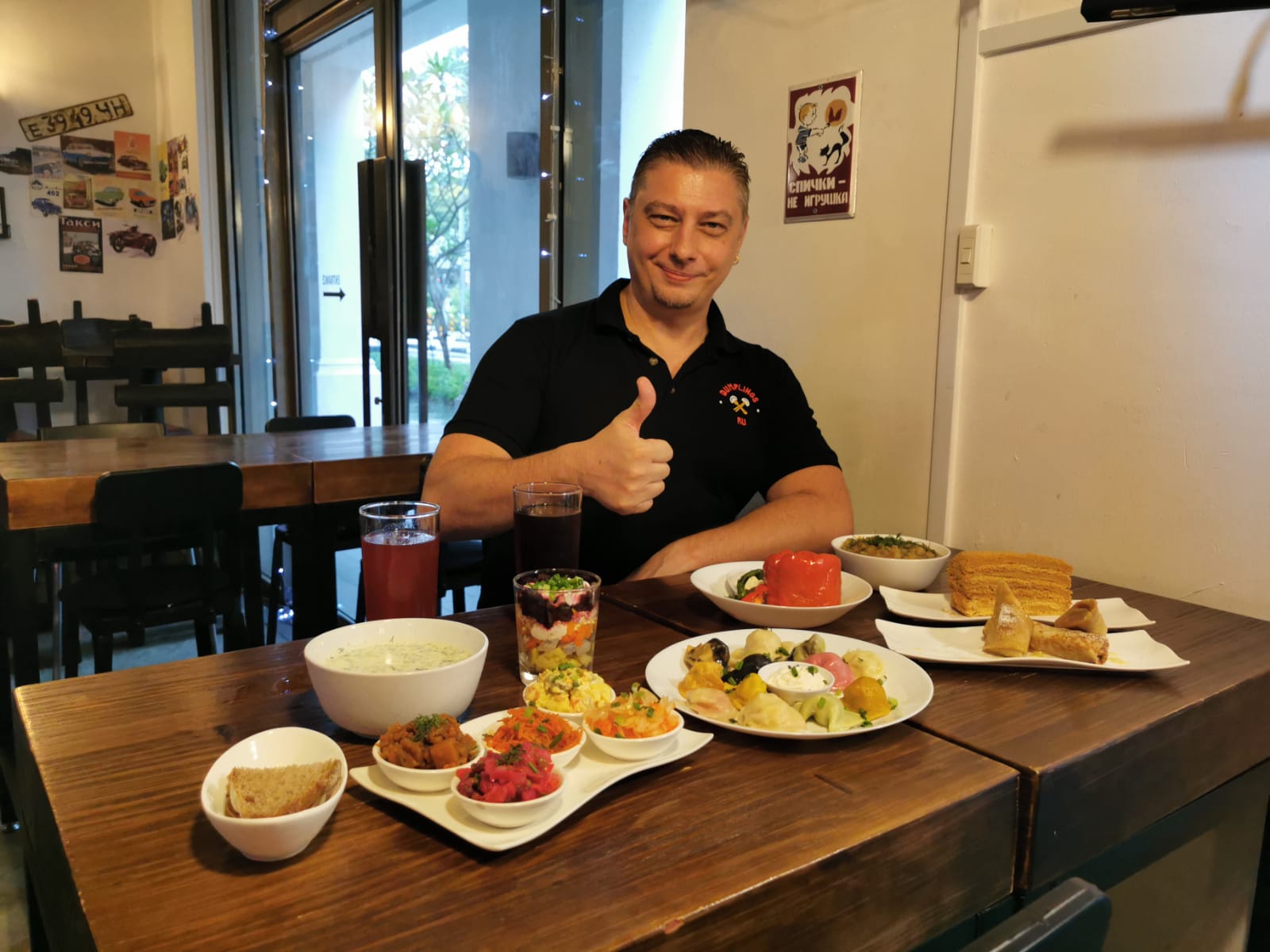
Dumplings are ubiquitous throughout global cuisine. From Zoubovksi’s Russian pelmeni and the pleated half-moons of Ukrainian vareniki to the thin-skinned mandu of the Korean eatery next to Dumplings Ru, many culinary cultures boast their own parcels of meat, vegetable or fruit filling in a carefully folded skin. They also represent historical ties between Europe and Asia. Pelmeni is thought to have entered Russia with nomadic Mongols, migrating through Siberia and the Urals and then gradually to Eastern Europe around the 14th century.
Food and war are also closely intertwined. Directly depriving populations access to food is a prohibited method of warfare. Decimation of farms, livestock and other infrastructure can rapidly lead to malnutrition and famine as displaced civilians are cut off from supplies and hard-hit economies inflate prices.
“During conflict, food can be used as a weapon to control food production and supply,” said Keri Matwick, professor of food philosophy at Singapore’s Nanyang Technological University. “Lack of resources weakens a country.”
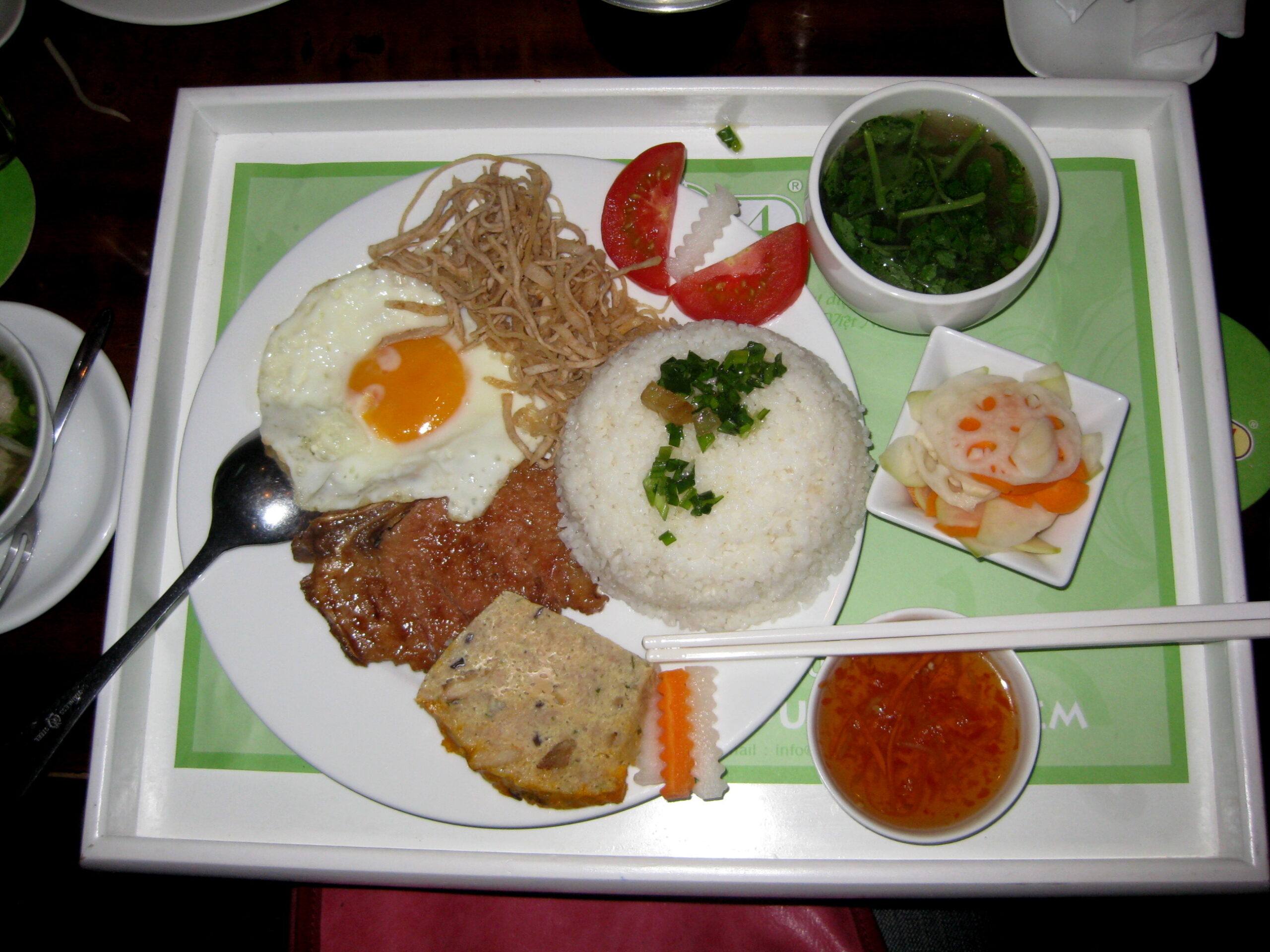
Hungry stomachs and desperate minds innovate out of necessity. Vietnam’s cơm tấm (‘broken rice’) thrived as a rural staple after World War II when land traditionally used to plant rice was taken over by French and Japanese cultivation of dyes, fibres and cotton and fuller grains were used to feed military occupiers. When large numbers of farmers migrated following the Vietnam War, they spread the dish’s popularity into cities.
Spam became popular in the Philippines after the canned meat was introduced by American troops who came to the region following the 1941 bombing of Pearl Harbor. Singapore’s foodie culture turned to local ingredients under the Japanese occupation from 1942 to 1945 and birthed dishes including sotong (squid) with kiam chye (pickled vegetables).
Matwick believes that during times of conflict food can also serve as a unifying source of national identity, when culinary pride in one’s cuisine is transferred to the nation itself.
“This culinary nationalism can become particularly salient when threatened, such as now with Ukraine,” she said.
Behind their conflict, Russia and Ukraine have a shared food history.
According to Ivan Brehm, head chef at Appetite, a restaurant and research centre for food anthropology, dumplings entered both countries through interaction with Turkic peoples who had crossed through Central Asia. “There was already a common conversation of cultures sharing their knowledge through trade and war and migration,” he said.
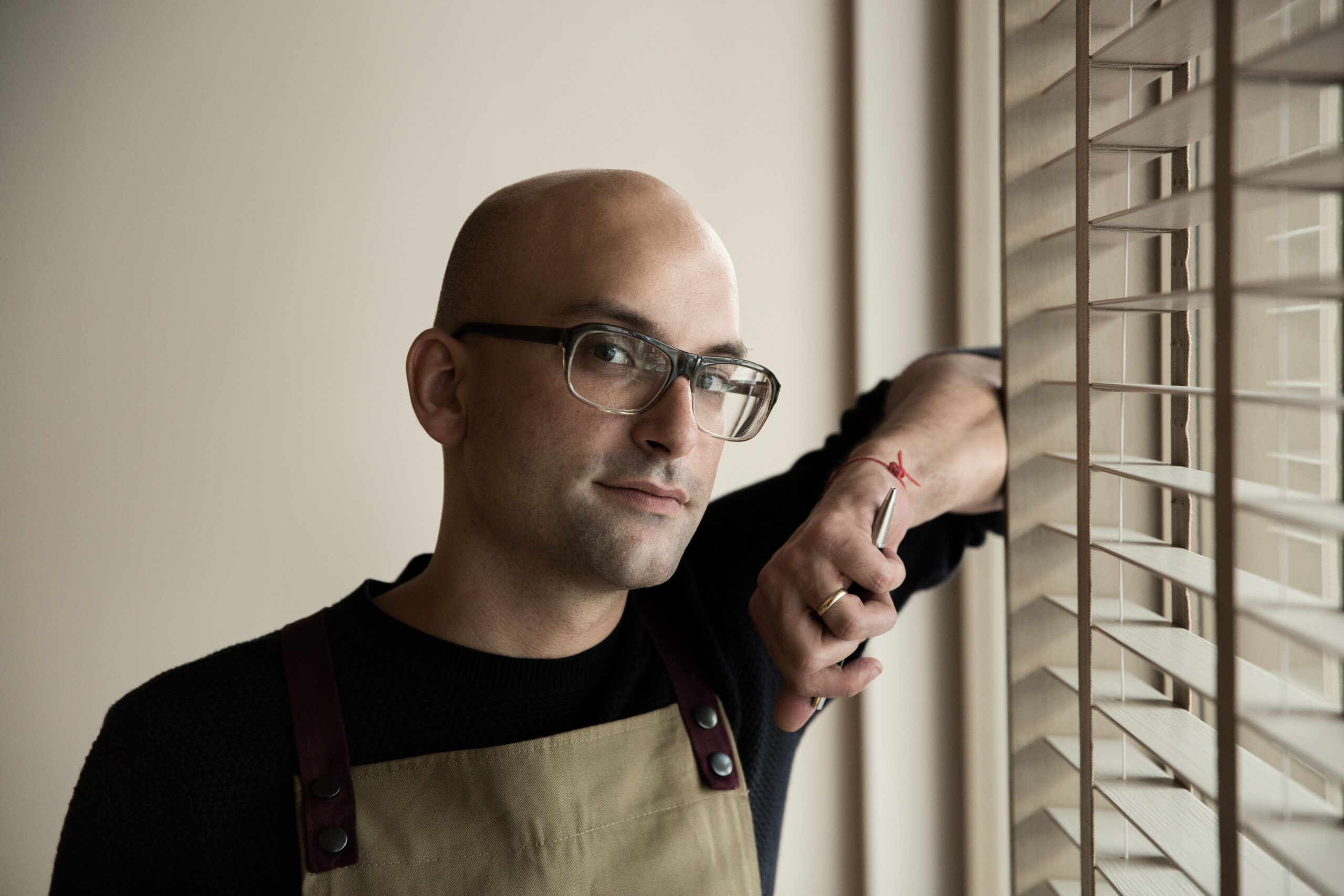
Appetite’s mission is to raise education on the significance of food in shaping cultural and historical discourse. As a Brazilian of Ukrainian-Russian heritage, Brehm had little idea of his grandmother’s Ukrainian culture growing up until he heard his father mention her past in the disputed Donetz area. Mementoes, however, were often served in his childhood meals: boiled tongue, pickled herring and beetroot salads and vareniki dumplings, flavours familiar across the cuisine of both countries.
“To talk about dumplings as a trademark of both Russian and Ukrainian history [shows] that they are not isolated at all,” he said. “There’s Muslim history happening both Ukraine and Russia. There’s Asian history happening in both. Anthropologically speaking, dumplings are a great metaphor for how this conflict itself is crap.”
Zoubovski agrees. Dumplings Ru launched from the then-shipping executive’s dream to create a space where people could celebrate the shared experience of food, despite cultural differences.
“I am Russian. I am Ukrainian,” he said. “The taste of our food doesn’t change because of this war.”

Following Singapore’s 5 March announcement of sanctions against four major Russian banks, Brehm is open about his support for economic crackdowns against Russia. He believes the socio-cultural influence restaurateurs hold has given him and fellow chefs and food educators a platform and they should not remain silent.
“Putin is a dictator. He has an incredibly strong grasp on what narratives are okay. But that grasp has also been empowered by people not saying something over time,” he said.
Zoubovski voices a more cautious acceptance. “Money is the easiest loss to make back. Human loss, you cannot,” he said.
Currently, though, his focus is making money. As Zoubovski plans a new stall at Singapore’s well-known hawker market, Lau Pa Sat, and juggles Ukrainian and Russian identities, his son, now in his 20s, is becoming a true-blue Singaporean.
“He’s even done National Service,” Zoubovski said with a smile.


